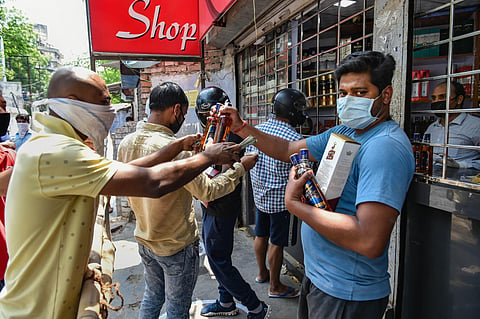

NEW DELHI: The COVID-19 cess levied in varying degrees by revenue-sapped states has taken a toll on alcohol makers -- stretching their working capital and eating into cash flow. In contrast to the early trends when long queues outside shops may have given an impression that the alcohol industry would remain an outlier in a moribund economy, industry executives say that ‘unrealistic’ tax on alcohol has done more damage to the industry than the pandemic.
Demand in states such as New Delhi, West Bengal, Andhra Pradesh and Telangana has tumbled, with brewers bearing a major brunt. “After the drastic price hike in some states, the industry has registered about 80 per cent decline in overall beer volume in May - a peak season for beer - versus last year. The hike in duty is also having knock-on effects on the ancillary segments as well, especially farmers, the entire supply chain ecosystem with barley malt suppliers and logistics partners. We believe the prevailing duty hike will dampen growth this year,” said Kartikeya Sharma, President – South Asia, AB InBev.
In India, beer is taxed 60 per cent higher than stronger spirits despite the lower alcohol content, that ranges from 4-7 per cent as against upwards of 40 per cent in hard liquor. With the disparity in taxation, the prices have increased by nearly Rs. 100 in a few states. In Delhi, for instance, a bottle with MRP of Rs 100 earlier, now sells at Rs 170. Such an extraordinary hike, Sharma said, is a “short-sighted approach” that would subsequently engender a loss in state revenues and force consumers to opt for cheaper, low-quality drinks to avoid burning a hole in their pocket.
Hard spirits makers, too, are facing a similar challenge. According to Anand Kripalu, CEO, United Spirits Ltd, the outlook for next year remains “uncertain” as the muted demand scenario due to high taxes outweigh opportunities such as online sales and home delivery. During the quarter ended March, net sales from its ‘prestige and above’ category which includes the likes of Johnnie Walker, Vat 69 and McDowell's No 1 whiskey declined 15.6 per cent, disproportionately impacted by drying up of social occasions and closure of bars. While volumes will be impacted across categories in the months to come, the premium imported liquor brands will be the hardest hit as bars remain shut, he says.
Meanwhile, brokerages have downgraded the industry from 'positive' to ‘neutral' in light of the jump in taxes and also believe a reversal of this hike is unlikely.
“The reversal of tax increases, once initiated, is the rarest of the phenomenon. One, it is seen as politically and socially challenging for a government to be aiding alcohol consumption. Secondly, once the state treasury gets a taste of higher tax inflows, giving it up it is difficult," said Dolat Capital Market. Analysts at Dolat Capital pegs revenue from alcohol as the percentage of states’ own tax revenue at about 21 per cent and as the percentage of revenue receipt is about 10 per cent, or Rs 2.25 lakh crore.
So far, the overall price has increased in 18 states and the hike in taxes ranges from 10 per cent to almost 75 per cent.
While brewers including AB InBev moot for a reformed policy where alcohol is taxed based on the level of alcohol content benefiting the consumers, the industry, as well as the states, lobby group Confederation of Indian Alcoholic Beverage Companies (CIABC) has sought for a “realistic” corona cess on alcoholic beverages in Delhi.
“Liquor sales have fallen drastically in Delhi by 58 per cent on a year-ago basis. On the other hand, sales in neighbouring states seem to be bouncing back in sharp contrast to Delhi. It may be noted that both Uttar Pradesh and Haryana have imposed a tax increase of not more than 10 to 15 per cent," said CIABC in the letter to Delhi Chief Minister Arvind Kejriwal. CIABC warned that the national capital city has porous borders and liquor prices in neighbouring states are much lower which is creating unlawful smuggling and depriving the state of its tax revenue.